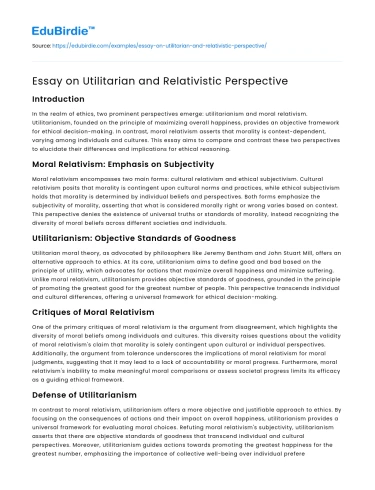Introduction
In the realm of ethics, two prominent perspectives emerge: utilitarianism and moral relativism. Utilitarianism, founded on the principle of maximizing overall happiness, provides an objective framework for ethical decision-making. In contrast, moral relativism asserts that morality is context-dependent, varying among individuals and cultures. This essay aims to compare and contrast these two perspectives to elucidate their differences and implications for ethical reasoning.
Moral Relativism: Emphasis on Subjectivity
Moral relativism encompasses two main forms: cultural relativism and ethical subjectivism. Cultural relativism posits that morality is contingent upon cultural norms and practices, while ethical subjectivism holds that morality is determined by individual beliefs and perspectives. Both forms emphasize the subjectivity of morality, asserting that what is considered morally right or wrong varies based on context. This perspective denies the existence of universal truths or standards of morality, instead recognizing the diversity of moral beliefs across different societies and individuals.
Save your time!
We can take care of your essay
- Proper editing and formatting
- Free revision, title page, and bibliography
- Flexible prices and money-back guarantee
Utilitarianism: Objective Standards of Goodness
Utilitarian moral theory, as advocated by philosophers like Jeremy Bentham and John Stuart Mill, offers an alternative approach to ethics. At its core, utilitarianism aims to define good and bad based on the principle of utility, which advocates for actions that maximize overall happiness and minimize suffering. Unlike moral relativism, utilitarianism provides objective standards of goodness, grounded in the principle of promoting the greatest good for the greatest number of people. This perspective transcends individual and cultural differences, offering a universal framework for ethical decision-making.
Critiques of Moral Relativism
One of the primary critiques of moral relativism is the argument from disagreement, which highlights the diversity of moral beliefs among individuals and cultures. This diversity raises questions about the validity of moral relativism's claim that morality is solely contingent upon cultural or individual perspectives. Additionally, the argument from tolerance underscores the implications of moral relativism for moral judgments, suggesting that it may lead to a lack of accountability or moral progress. Furthermore, moral relativism's inability to make meaningful moral comparisons or assess societal progress limits its efficacy as a guiding ethical framework.
Defense of Utilitarianism
In contrast to moral relativism, utilitarianism offers a more objective and justifiable approach to ethics. By focusing on the consequences of actions and their impact on overall happiness, utilitarianism provides a universal framework for evaluating moral choices. Refuting moral relativism's subjectivity, utilitarianism asserts that there are objective standards of goodness that transcend individual and cultural perspectives. Moreover, utilitarianism guides actions towards promoting the greatest happiness for the greatest number, emphasizing the importance of collective well-being over individual preferences.
Personal Example: Utilitarian Dilemma
To illustrate the contrasting implications of utilitarianism and moral relativism, consider a personal ethical dilemma involving cheating during an exam. From a moral relativist perspective, the morality of cheating may vary depending on individual beliefs or cultural norms. However, utilitarianism offers a clear framework for evaluating the consequences of cheating in terms of its impact on overall happiness. In this scenario, the utilitarian approach may prioritize the integrity of academic standards and the fairness of evaluations, outweighing individual desires or cultural norms.
Conclusion
In conclusion, the comparison between utilitarianism and moral relativism highlights the divergent approaches to ethical reasoning. While moral relativism emphasizes the subjectivity of morality and the diversity of moral beliefs, utilitarianism provides an objective framework grounded in the principle of maximizing overall happiness. Despite its criticisms, utilitarianism offers a more justifiable and universal perspective on ethics, guiding actions towards promoting the greatest good for the greatest number. Ultimately, ethical decision-making necessitates a nuanced understanding of both individual and collective well-being, transcending individual and cultural differences.






 Stuck on your essay?
Stuck on your essay?

